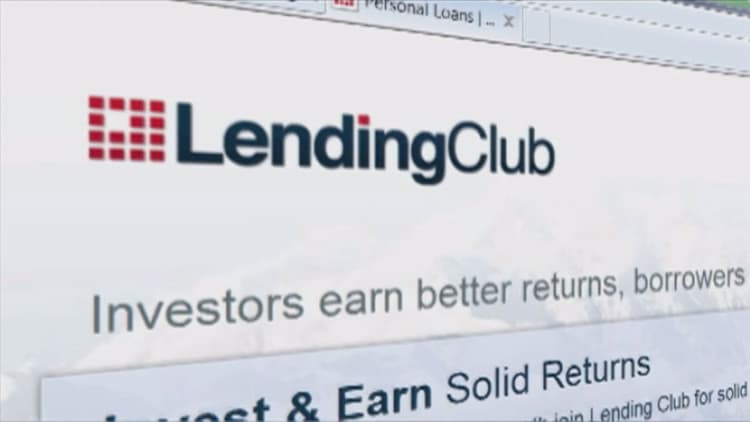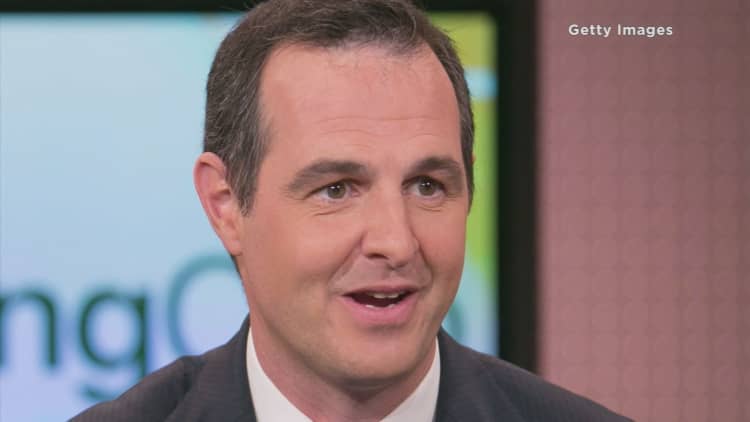
LendingClub investors are bailing, and interns are paying some of the price.
Since ex-CEO Renaud Laplanche's forced resignation last week, the stock has plunged by half, the company has come under federal investigation, and capital flows have slowed. Now, CNBC.com has learned that LendingClub canceled its 10-week summer internship program.
"It's certainly not a decision that was taken lightly, but we think it's the most prudent course of action for everyone involved," a spokesperson for the San Francisco-based company said in an e-mailed statement. "It gives these individuals time to secure another position for the summer while we continue to evaluate our broader staffing needs."
While the news is a bummer for ambitious college students hoping to beef up their resume and rolodex, LendingClub has greater concerns at the moment. The online lender counts on individual and institutional investors for capital so that it can fund loans for consumers and small businesses. Without that money, it can't grow.
Over the past half-decade, cash has poured in because the yields have far exceeded what investors could get from other forms of fixed-income assets. But since the disclosure last week that Laplanche and three other executives knowingly sold a basket of loans to an institution that didn't meet the buyer's criteria, trust in the company and future returns on the loans has diminished.
There's even data showing that existing investors are trying to sell their notes. According to LendingRobot, a service that allows loan buyers to automate purchases and helps them sell their positions, there are about 500,000 loans for sale on the secondary market, up from 300,000 before the swoon.
LendingClub's plunge
Sellers are also willing to take a lower price for the loans than they were prior to Laplanche's departure, said Michael Phillips, co-founder of NSR Invest, a provider of data and investment services. Clients are calling in for advice.
"There are lots of questions, lots of concerns," said Phillips.
LendingRobot and NSR both cited data from FOLIOfn, which offers a secondary marketplace for investors to sell their loans. With no liquid trading market for LendingClub loans, it's the only real way for retail investors to divest.
LendingClub, which launched its marketplace lending service in its current form in 2008, carries additional risk. The company, like smaller rival Prosper Marketplace, issues unsecured consumer loans, so if the borrower stops paying, the investor loses out. Lenders have been able to mitigate this risk by diversifying across a wide portfolio of notes, putting as little as $25 into a single loan.
Charge-offs have been minor to date — low single digits for the highest-quality loans — so investors have made out fine. But now there's concern that some borrowers will be reading stories about a flailing company and decide they no longer need to pay their bills, causing a potential uptick in defaults.
"Ultimately, these are unsecured loans," Phillips said. "So maybe some borrowers view it as, `Oh, is this company even legitimate, what happens if I don't pay?'"
Of course, borrowers are still obligated to pay. LendingClub has an agreement with Portfolio Financial Servicing Company to service the loans should the company go bankrupt.
It could still get messy for investors. As the company says on its website, "If LendingClub were to go out of business, investors may not receive the full amount of payments due and to become due on the note, or such payments may be delayed as bankruptcy or other proceedings make their way through the courts."
Read MoreYou can't chase returns like this in the stock market
Peter Renton, founder of industry blog Lend Academy, doesn't see it getting that far. He expects a private equity firm or bank to acquire the company if, for nothing else, its database of more than 1 million borrowers and 100,000 investors.
"That will have a lot of value to many folks," he said. "For that reason, I am not that concerned for retail investors."
A LendingClub spokesperson declined to comment on a potential sale or activity in the secondary market.
The company has to dig itself out of a deepening hole. LendingClub said in a regulatory filing Monday that it received a subpoena from the U.S. Department of Justice and that it was contacted by the Securities and Exchange Commission after the announcement of its mishandled loans.

In the same filing, LendingClub dropped this bombshell, "A number of investors that account for, in the aggregate, a significant amount of investment capital on the platform, have paused their investments in loans through the platform in the last five business days."
The company is exploring potentially dilutive debt and equity methods to raise money.
The stock, already beaten down by last week's news, dropped another 8.6 percent to $3.60 after Tuesday's disclosures. It's down 67 percent this year and 76 percent below its IPO from December 2014.
Some of the money that had been chasing LendingClub's high yields is turning to other emerging online platforms. PeerStreet, a marketplace that allows lenders to invest in real estate loans, is seeing heightened volume, said Brett Crosby, co-founder and operating chief at the Southern California start-up.
Because PeerStreet loans are secured by first liens on real estate, investors shoulder less default risk than with consumer debt.
"We've seen a lot of new users coming over that were elsewhere," Crosby said. "They're saying, `We like the fact that your asset is secured by real estate and there is a real underlying asset.'"
PeerStreet is only available to accredited investors, or those with an annual income of $200,000 or net worth of $1 million. The retail investor that's been able to generate income from LendingClub and Prosper can't participate.
And speaking of participation, LendingClub's prospective interns are now looking for jobs elsewhere. One of them took to Reddit on Monday looking for answers:
Just received a call from LendingClub stating that they are canceling their summer internship program. I have already made living arrangements for this summer in SF. I know many interns are coming from the east coast and have already made travel plans and living arrangements. Are we all just SOL? What now?
The same questions can be asked of LendingClub.
— Lauren Thomas contributed to this report.




